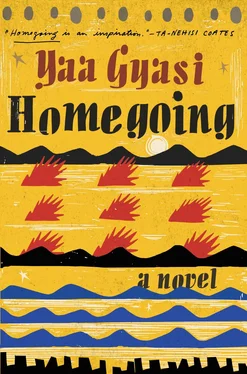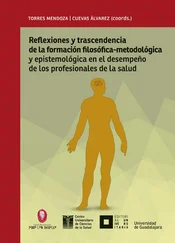Next to him, Marjorie shifted her weight, and Marcus tried not to look at her. It was the way most people lived their lives, on upper levels, not stopping to peer underneath.
And soon they were headed down. Down into the belly of this large, beached beast. Here, there was grime that could not be washed away. Green and gray and black and brown and dark, so dark. There were no windows. There was no air.
“This is one of the female dungeons,” the guide said finally, leading them into a room that still smelled, faintly. “They kept as many as two hundred and fifty women here for about three months at a time. From here they would lead them out this door.” He walked further.
The group left the dungeon and moved together toward the door. It was a wooden door painted black. Above it, there was a sign that read Door of No Return.
“This door leads out to the beach, where ships waited to take them away.”
Them. Them. Always them. No one called them by name. No one in the group spoke. They all stood still, waiting. For what, Marcus didn’t know. Suddenly, he felt sick to his stomach. He wanted to be somewhere else, anywhere else.
He didn’t think. He just started to push at the door. He could hear the guide asking him to stop, yelling at Marjorie in Fante. He could hear Marjorie too. He could feel her arm on his hand, then he could feel his hand push through, then, finally, there was light.
Marcus started running onto the beach. Outside, there were hundreds of fishermen tending their bright turquoise nets. There were long handcrafted rowboats as far as the eye could see. Each boat had a flag of no nationality, of every nationality. There was a purple polka-dotted one beside a British one, a blood-orange one beside a French one, a Ghanaian one next to an American one.
Marcus ran until he found two men with dark, gleaming, shoe-polish skin who were building a dazzling fire with flames that licked out and up, crawling toward the water. They were cooking fish on the fire, and when they saw him, they stopped, stared.
He could hear her feet behind him before he could see her. The sound of feet hitting sand, a light, muffled sound. She stopped many paces away from him, and when she spoke, her voice was a distant thing carried by sea-salted wind.
“What’s wrong?” Marjorie shouted. And he just kept staring out into the water. It went every direction that his eye could see. It splashed up toward his feet, threatening to put out the fire.
“Come here,” he said, finally turning to look at her. She glanced at the fire, and it was only then he remembered her fear. “Come,” he said again. “Come see.” She stepped a little bit closer, but stopped again when the fire roared into the sky.
“It’s okay,” he said, and he believed it. He held out his hand. “It’s okay.”
She walked to where he stood, where the fire met the water. He took her hand and they both looked out into the abyss of it. The fear that Marcus had felt inside the Castle was still there, but he knew it was like the fire, a wild thing that could still be controlled, contained.
Then Marjorie released his hand. He watched her run, headlong, into the crashing waves of the water, watched her dip under until he lost her and all he could do was wait for her to resurface. When she did, she looked at him, her arms moving circles around her, and though she didn’t speak, he knew what she was saying. It was his turn to come to her.
He closed his eyes and walked in until the water met his calves, and then he held his breath, started to run. Run underwater. Soon, waves crashed over his head and all around him. Water moved into his nose and stung his eyes. When he finally lifted his head up from the sea to cough, then breathe, he looked out at all the water before him, at the vast expanse of time and space. He could hear Marjorie laughing, and soon, he laughed too. When he finally reached her, she was moving just enough to keep her head above water. The black stone necklace rested just below her collarbone and Marcus watched the glints of gold come off it, shining in the sun.
“Here,” Marjorie said. “Have it.” She lifted the stone from her neck, and placed it around Marcus’s. “Welcome home.”
He felt the stone hit his chest, hard and hot, before finding its way up to the surface again. He touched it, surprised by its weight.
Marjorie splashed him suddenly, laughing loudly before swimming away, toward the shore.
I am incredibly grateful to Stanford University’s Chappell-Lougee Fellowship, the Merage Foundation for the American Dream Fellowship, the University of Iowa’s Dean’s Graduate Research Fellowship, and the Whited Fellowship for supporting this work over the last seven years.
Many, many thanks to my agent, Eric Simonoff, for being so sure and so wise, a fierce advocate for this novel. I am also grateful for the rest of the wonderful team at WME, especially Raffaella De Angelis, Annemarie Blumenhagen, and Cathryn Summerhayes for so brilliantly representing me to the rest of the world.
Enormous thanks to my editor, Jordan Pavlin, for her encouragement and graceful editing, her steadfast belief in this novel, and for taking such great care. Thanks also to everyone at Knopf for their boundless enthusiasm. Another thanks goes to Mary Mount and everyone at Viking UK.
For the bedrock of friendship: Tina Kim, Allison Dill, Raina Sun, Becca Richardson, Bethany Woolman, Tabatha Robinson, and Faradia Pierre.
Thank you to Christina Ho, first reader and beloved friend, for seeing this novel in every messy iteration and for assuring me, at each turn, that it was worth pushing forward.
It was such a privilege to spend two years at the Iowa Writers’ Workshop. Thank you Deb West, Jan Zenisek, and Connie Brothers. Thanks also to my classmates there, especially to the ones who gave advice, encouragement, and a home-cooked meal, sometimes all in the same night: Nana Nkweti, Clare Jones, Alexia Arthurs, Jorge Guerra, Naomi Jackson, Stephen Narain, Carmen Machado, Olivia Dunn, Liz Weiss, and Aamina Ahmad.
I have had the extraordinary good fortune of having teachers who made me feel, even when I was just a child, that my dream of becoming a writer was not only possible, but a foregone conclusion. I cannot say thank you enough for that early support, but I will continue to try. In Alabama: Amy Langford and Janice Vaughn. At Stanford: Josh Tyree, Molly Antopol, Donna Hunter, Elizabeth Tallent, and Peggy Phelan. At Iowa: Julie Orringer, Ayana Mathis, Wells Tower, Marilynne Robinson, Daniel Orozco, and Sam Chang. I must say another thank-you to Sam Chang for believing in this book from the very first word, for making sure I had everything I needed in order to work, and for that phone call in 2012.
Thank you to Hannah Nelson-Teutsch, Jon Amar, Patrice Nelson, and, in loving memory, Clifford Teutsch for their support and warm welcome.
I owe so much to my parents, Kwaku and Sophia Gyasi, who, like so many immigrants, are the very definition of hard work and sacrifice. Thank you for cutting a path so that it might be easier for us to walk. Thank you to my brothers, Kofi and Kwabena, for walking with me.
Another special thank-you to my father and Kofi for fielding countless research questions. In addition to their helpful answers and suggestions, some of the books and articles I consulted were: The Door of No Return by William St. Clair, Mission from Cape Coast Castle to Ashantee by Thomas Edward Bowdich, The Fante and the Transatlantic Slave Trade by Rebecca Shumway, The Human Tradition in the Black Atlantic, 1500–2000 edited by Beatriz G. Mamigonian and Karen Racine, A Handbook on Asante Culture by Osei Kwadwo, Spirituality, Gender, and Power in Asante History by Emmanuel Akyeampong and Pashington Obeng, Black Prisoners and Their World, Alabama 1865–1900 by Mary Ellen Curtin, “From Alabama’s Past, Capitalism Teamed with Racism to Create Cruel Partnership” by Douglas A. Blackmon, Twice the Work of Free Labor: The Political Economy of Convict Labor in the New South by Alex Lichtenstein, “Two Industrial Towns: Pratt City and Thomas” from the Birmingham Historical Society, Yaa Asantewaa and the Asante-British War of 1900–1 by A. Adu Boahen, and Smack: Heroin and the American City by Eric C. Schneider.
Читать дальше

![Ally Carter - [Gallagher Girls 01] I'd Tell You I Love You But Then I'd Have to Kill You](/books/262179/ally-carter-gallagher-girls-01-i-d-tell-you-i-lo-thumb.webp)










